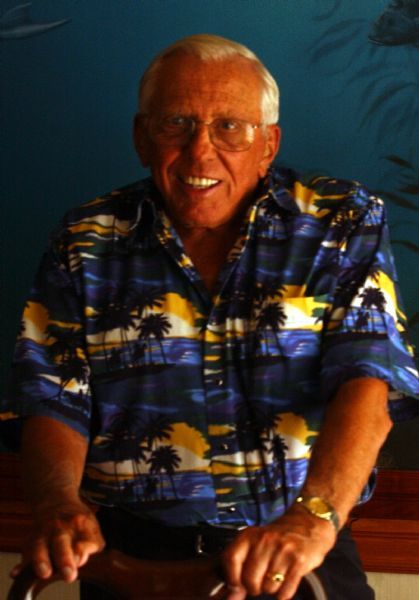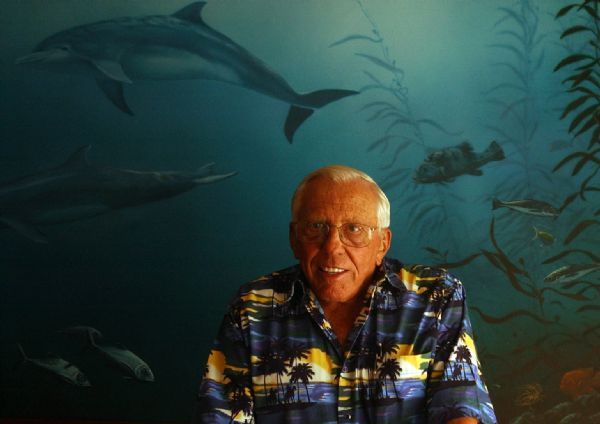This is an archived article that was published on sltrib.com in 2010, and information in the article may be outdated. It is provided only for personal research purposes and may not be reprinted.
Before Management & Training Corp. guarded thieves and murderers, it taught Utah teenagers and twentysomethings how to type, fix cars and cook.
Centerville-based MTC began as the private operator of the Job Corps program in Clearfield before venturing into the private prison business. Its operations include the Kingman, Ariz., medium-security prison under scrutiny since three violent criminals cut a perimeter fence and escaped July 30. Two inmates and a woman who helped them escape remain on the run, and the director of the Arizona Department of Corrections has suggested "lax" security could be to blame.
But Robert L. Marquardt, the 84-year-old patriarch of the family behind MTC, stands behind the company's work.
"This is the first major glitch we've had, and I pray they pick the two guys up and nobody gets hurt," Marquardt said in a brief telephone conversation Thursday.
MTC and the Arizona Department of Corrections have said little about mistakes that led to the escape. Members of the Marquardt family declined further interview requests.
MTC traces its roots to 1958, when Marquardt moved to Ogden to work for defense contractor Morton Thiokol. The company was best known for manufacturing bombs, but it also had a contract to operate Job Corps centers for the U.S. Department in Labor.
When Thiokol decided to divest its less -profitable divisions in 1980, Marquardt and partners borrowed $3.5 million to buy the education contracts and start MTC.
"After 25 years of marketing bigger bombs to kill more people, it got to me," Marquardt told The Tribune in 2004.
In 1987, California officials approached MTC about operating a minimum-security state prison in Eagle Mountain, Calif., with an emphasis in rehabilitation. Today, MTC manages a mix of 17 federal and state facilities in Texas, New Mexico, Arizona, California, Idaho and Ohio. The company can house more than 21,000 inmates and employs about 4,400 corrections staff.
"Our unofficial motto is: rehabilitation through education," MTC spokesman Carl Stuart said.
At one point MTC also operated prisons in Canada and Australia. It operated a minimum-security facility at the prison in Draper from 1994 until 2001, when a state budget crunch forced the facility's closure.
The company left Ogden and moved its headquarters into a four-story building in Centerville in 2001. Today, MTC receives about an equal amount of revenue from its prisons and job-training divisions, Stuart said. The company also has divisions which provide medical services to prisons and which works with foreign governments to provide job training.
Meanwhile, MTC became a family business. Marquardt's son, Scott Marquardt, succeeded him as CEO in 1997. Robert Marquardt remains board chairman, while his daughter, Jane Marquardt, is vice chairwoman.
The family has community interests, too.
In the early 1990s, Marquardt took a year absence from MTC to raise about $4 million for the development of the Ogden River Parkway. He has also raised money for the Ogden Eccles Dinosaur Park and continues to serve on the board of directors for the park's foundation.
Scott Marquardt, 46, is a member of the Utah Board of Regents who has served on the board of trustees for Weber State University. He has been a vocal opponent of reducing state spending on colleges and universities.
Jane Marquardt, 59, has used her law practice to help same-sex couples protect their legal rights. She served on the board of Equality Utah, which advocates on issues affecting gay, lesbian, bisexual and transgended people. She has pushed for domestic partner benefits at the Capitol and in Salt Lake City.
Yet MTC's prison division has brought the most attention. MTC, which claims to be the third-largest private prison operator in the country, has been in the middle of America's ongoing debate over the merits of private prisons.
While MTC and other private-prison supporters claim they save taxpayers money, opponents say the trade-off is poor treatment for inmates.
A few inmate deaths haven't helped MTC's arguments. In January 2002, an inmate hanged himself at an MTC-run jail in Santa Fe, N.M., and a U.S. Department of Justice audit found MTC did not do enough to stop it, and alleged deficiencies in the jail's health care. In 2004, two inmates at the jail beat another to death.
In 2003, two inmates died during a riot at the Eagle Mountain, Calif., facility.
Gerald Gaes, a former U.S. Bureau of Prisons director of research, said a field of studies have shown private prisons are not necessarily cheaper, but they also aren't necessarily managed worse than conventional prisons.
"It really boils down to how good the government is at negotiating the contract," Gaes said.
As much as three-quarters of a prison's cost can come from personnel, Gaes said, and private prisons usually pay employees less retirement and benefits than does a government-run prison.
In July, the Louisville Courier-Journal reported MTC was offering $8.25 per hour starting pay at a facility it manages in Kentucky. That was about $3 less than two nearby prisons managed by the state of Kentucky, the newspaper reported. A federal prison in the Bluegrass State was offering $18.18 per hour, according to the report.
Stuart, the MTC spokesman, acknowledged retirement benefits for its workers are less than government typically provides, but said it's a misconception private prisons pay lower salaries.
"We couldn't maintain personnel, in the first place," Stuart said. "We'd pay for their training and then they'd go work for a state and make more."
Stuart said MTC also tries to save costs by using technology in place of personnel. Having one central control booth at a prison and cameras instead of guards can be more efficient, Stuart said. Government prisons are moving in the same direction, he said.
At the Kingman prison, The Associated Press reported prison staff did not notice when the inmates left their dorm room and rushed to the prison's perimeter. Alarms that were supposed to sound did not, the AP reported, and one of the men's girlfriend apparently threw wire cutters over the fence so the inmates could cut a hole and run off in their orange jumpsuits.
The director of the Arizona Department of Corrections said MTC will "be on the hook" for costs of capturing the remaining fugitives. But it was the department that decided the three inmates, two of whom were convicted of murder and one of attempted murder, were fit for a medium-security facility that focuses on preparing inmates for life after prison.
Stuart would not discuss the Kingman escape, but said MTC is cooperating with investigators.
"We don't believe it was training [that contributed to the escape] but what we do believe is we have to finish this investigation and see why it happened," Stuart said.
» As of Sept. 1, the company will manage 20 prisons or detention centers across the country, though none of them are in Utah. It also operates or cooperates in operating 24 job-training centers, such as Job Corps in Clearfield.
» In 2009, the company had more than $500 million in revenue.
» The company began in Ogden in 1980. It moved its headquarters to Centerville in 2001.
» MTC began contracting with the federal government to run job-training centers such as Clearfield's.
» In 1987, MTC entered the private prison business.





